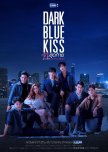This review may contain spoilers
Dark Blue Kiss explores the complexity of love and the socio-economic aspect of the symbolic closet.
Raw, Refreshing, and Realistic-- these are words that I would use to describe Dark Blue Kiss, a drama that tackles same-sex relationships in a lens that deeply roots itself to the struggle of acceptance of the self and by society. Being a story bound to the semblance of reality, it was able to serve the rawness of these relationships-- a refreshing approach as it tackles issues that the sector it aims to represent faces in real life. However, one of the most spellbinding elements of DBK is how it makes us understand the concept of the "closet" by closely knitting it to the socio-economic conditions of the characters in the story. Character backgrounds played a big role to further storytelling-- creating layers which reveals more to the characters and their motivations for their decisions.
We were given four main characters in the drama: Pete, Kao, Sun, and Mork. All of these characters are in the spectrum. But what creates the distinction is the fact that they came from varying economic backgrounds-- Pete and Sun are people from the middle to upper class, while Kao and Mork came from the middle to lower class. Notably, those in the higher echelons of society are "out of the closet" even if it's only to their families. On the other hand, we see how Kao and Mork aren't out, thus remaining hidden in the closet. With the need to hustle for their families, we realize how coming out is a privilege especially for people who are mired with societal expectations and responsibilities. As such, it also isn't easy to do in a world full of hatred and homophobia. This is the situation of Kao and Mork-- highly different from Pete and Sun. This dichotomy between their economic status makes it hard for both parties to enter a compromise-- resulting to conflicts. The socio-economic aspect of the closet then became the heart of the story, the driving force to further character and story development-- whether they would be able to open and face this closet is one of the questions inculcated to the viewers.
The story of DBK makes us understand more of the struggles of the LGBTQ+ community. It didn't only intend to show a charming and loving story between PeteKao and SunMork, but it also open the eyes of the viewers to the realities that people from the spectrum experience-- their path to self-acceptance and opening the closet, and being able to love without being judged for one's preference.
Over-all, I can say that the drama deserves a high rating. It's an honest portrayal of a story of those in the rainbow spectrum. It felt empowering. Although there are some areas that can be improved in the story department, the story is still stellar and it holds itself to a standard.
In the end, the drama aims to send a clear message: No one should be deprived of their capacity to express their love-- not by their gender nor by their sexuality.
(COOKIE BITS)
For the acting, TayNew's acting for this story is truly commendable. They brought us with them as we ventured into the story of PeteKao and their quest for happiness. Fluke and Podd was a breath of fresh air. AJ was so good in acting as a villain that he was able to pull some strings with his portrayal of Non. Over-all the acting deserves a high-rating.
Music is good. Opening sequence is a bomb cue Temptation of Wife realness. For its rewatch value, I'm giving it a nine just because my tendency to rewatch shows are low.
We were given four main characters in the drama: Pete, Kao, Sun, and Mork. All of these characters are in the spectrum. But what creates the distinction is the fact that they came from varying economic backgrounds-- Pete and Sun are people from the middle to upper class, while Kao and Mork came from the middle to lower class. Notably, those in the higher echelons of society are "out of the closet" even if it's only to their families. On the other hand, we see how Kao and Mork aren't out, thus remaining hidden in the closet. With the need to hustle for their families, we realize how coming out is a privilege especially for people who are mired with societal expectations and responsibilities. As such, it also isn't easy to do in a world full of hatred and homophobia. This is the situation of Kao and Mork-- highly different from Pete and Sun. This dichotomy between their economic status makes it hard for both parties to enter a compromise-- resulting to conflicts. The socio-economic aspect of the closet then became the heart of the story, the driving force to further character and story development-- whether they would be able to open and face this closet is one of the questions inculcated to the viewers.
The story of DBK makes us understand more of the struggles of the LGBTQ+ community. It didn't only intend to show a charming and loving story between PeteKao and SunMork, but it also open the eyes of the viewers to the realities that people from the spectrum experience-- their path to self-acceptance and opening the closet, and being able to love without being judged for one's preference.
Over-all, I can say that the drama deserves a high rating. It's an honest portrayal of a story of those in the rainbow spectrum. It felt empowering. Although there are some areas that can be improved in the story department, the story is still stellar and it holds itself to a standard.
In the end, the drama aims to send a clear message: No one should be deprived of their capacity to express their love-- not by their gender nor by their sexuality.
(COOKIE BITS)
For the acting, TayNew's acting for this story is truly commendable. They brought us with them as we ventured into the story of PeteKao and their quest for happiness. Fluke and Podd was a breath of fresh air. AJ was so good in acting as a villain that he was able to pull some strings with his portrayal of Non. Over-all the acting deserves a high-rating.
Music is good. Opening sequence is a bomb cue Temptation of Wife realness. For its rewatch value, I'm giving it a nine just because my tendency to rewatch shows are low.
Was this review helpful to you?


























